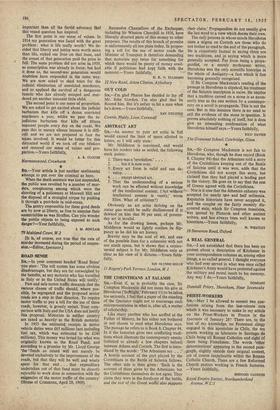THE CORINTHIANS AT SALAMIS SIR, —Even if, as is probably
the cast, Sir Compton Mackenzie did not mean his gibe at Herodotus ('Sidtlight,' February 11) to be taken too seriously, I feel that a paper of the standing of the Spectator ought not to encourage such misrepresentation in what is, after all, a matter of scholarship.
Like many another who has scoffed at the Father of History, he has either not bothered or not chosen to read what Herodotus says. The passage he refers to is Book 8, Chapter 94. In it the historian gives two conflicting tradi- tions which illustrate the contemporary enmity (referred to already a few chapters before) between Athens and Corinth. The first is intro- duced by the words : 'The Athenians say . . A hostile account of the part played by the Corinthians in the Battle of Salamis follows. The other side is then given : 'Such is the account of them given by the Athenians; but the Corinthians themselves do not agree. They claim they were in the forefront of the battle, and the rest of the Greek world also supports The only persons in whose minds Herodotus casts a stigma on Corinth are those who do not bother to read to the end of the paragraph. He is objectively factual in saying there are two traditions, andin saying which is more generally accepted. Par from being a propa- gandist, or a merely mythopceic writer, Herodotus was the only scientific historian in the whole of Antiquity—a fact which is fast becoming generally recognised.
If Sir Compton Mackenzie's reading of the passage in Hcrodotus is slipshod, his treatment of the Salamis inscription is naive. He implies that a tradition carved on a stone is as neces- sarily true as the one written by a contempo- rary on a scroll is propaganda. This is not the case. But in this instance there is no need to call the evidence of the stone in question. It proves absolutely nothing of itself, but it does give an interesting confirmation of what Herodotus himself says.—Yours faithfully,










































 Previous page
Previous page